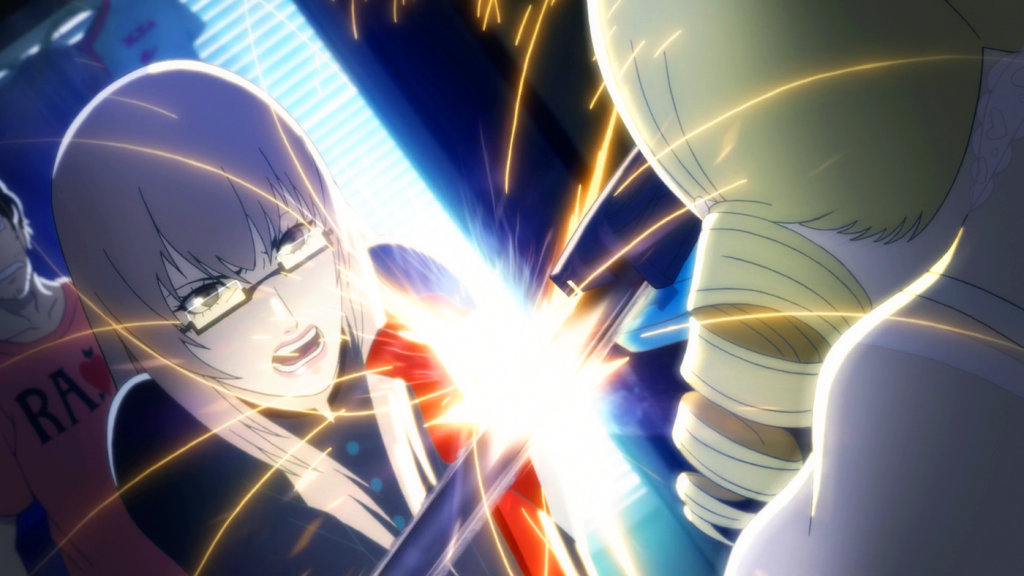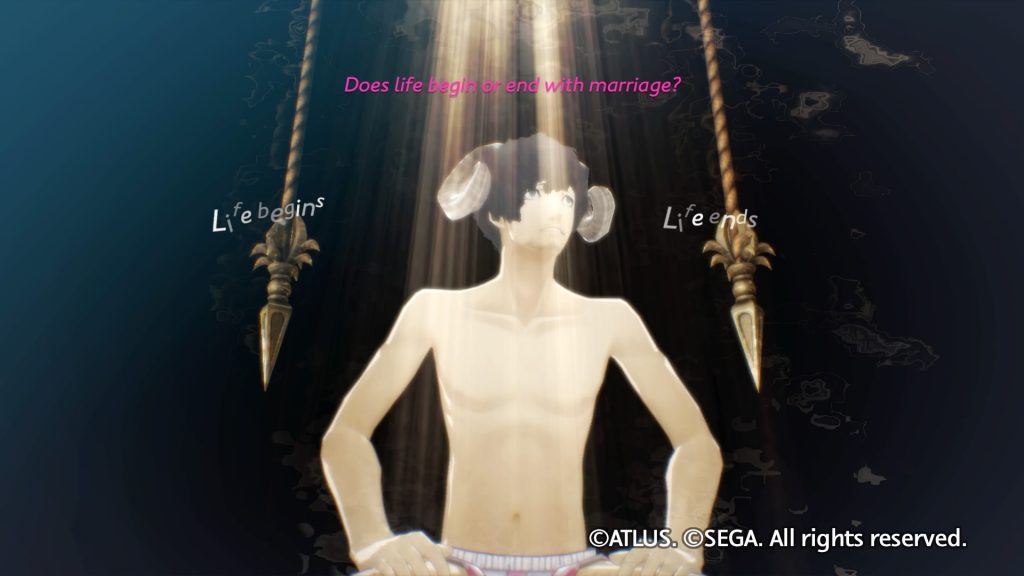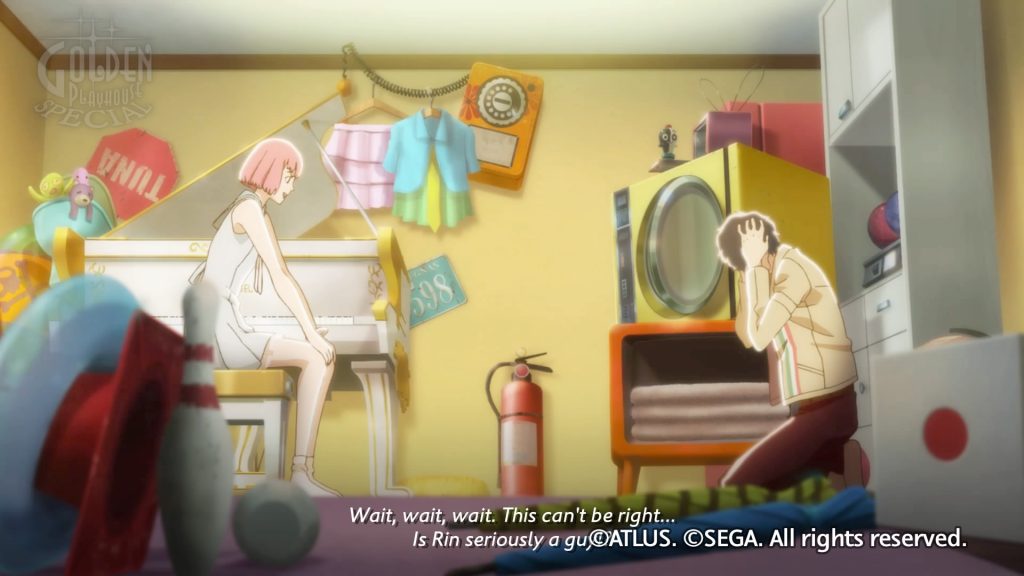
Catherine: Full Body looks to make good on relationships and queer people
There will be spoilers for Catherine Full Body in this article. Read with caution or head back to the homepage.
With some new additions in characters and storylines, Catherine: Full Body appears to be an attempt to make good on some of the original game’s archaic views on relationships, societal expectations, and a dehumanizing view of queer people.
But while the characters and narrative at large have to reckon with the cis-heteronormative views it put forth eight years ago, is it enough to undo the damage and trappings of a story so ingrained in those same views? It depends on who you ask.
When the original game launched in 2011, Catherine was already loaded with perceptions and ideas about who men and women are or, in some cases, who it believes they should be. For the most part, this is framed through protagonist Vincent’s decision to either marry his high school sweetheart Katherine, or succumb to his base desires by pursuing a younger woman named Catherine, and live a life free from the supposed shackles of matrimony.
It’s a very cynical, black-and-white view of relationships, and the expectations it puts on both men and women are deeply rooted in traditional gender roles. When these same expectations are projected onto people outside of the cis-heteronormative spectrum, it becomes blatantly apparent how antiquated the boxes Catherine tries to put everyone in are, and that they’re damaging in the values it puts on people based on its own narrow views of gender.

No character is more tormented by these perceptions than Erica, a waitress at Vincent’s favorite bar, a friend from his high school days, and, as is revealed at the end of the game, a trans woman.
Depending on who you ask, Erica is either a wonderful example of a trans woman with confidence and agency not often afforded to trans characters, or she’s a woman being denied the validation she deserves by a story hellbent on keeping it from her. Catherine is a story that treats men and women differently, and by treating Erica like she is a man it attempts to question the authenticity of her entire identity.
Bella Blondeau, esports editor at The Gamer and a trans woman, says she believes that, while questionable in 2019, for a game released in 2011, Catherine’s portrayal of Erica was far ahead of its time.
“For something made in 2011, it’s exceptional, in my opinion,” Blondeau said. “Erica is a woman who isn’t defined by suffering, she isn’t a subject of tragedy porn, she has a successful career, flirts with guys, dresses how she wants, does whatever she wants. That’s incredible. Modern trans narratives now barely hit those checkboxes.”

In Catherine, men are being subjected to nightmares that, if they’re unable to escape, can result in their deaths in the real world. Eventually, Erica is subjected to these nightmares as well, upset at her inability to have children. Much of this is rooted in Japanese culture, where people who undergo transition are sterilized, which Anime Feminist discusses at length. But by putting Erica in these nightmares, which are well-established as being exclusive to men, Catherine questions the legitimacy of Erica’s gender.
Outside of the nightmares, Erica’s transition is treated like a dark secret among people she perceives as friends, as Vincent and high school friends Jonny and Orlando have private discussions about outing her to their newer friend Toby, who has shown romantic interest in her. Vincent makes off-hand comments about Erica not being able to compete in women’s wrestling, attempts to discredit her insight on issues relating to gender, and basically bolsters the story’s claims that Erica, despite everything, is still a man.
All this treatment is wrapped up in one of the endings, where Toby finds out about Erica’s past and acts as if he regrets sleeping with her. While the game plays this off for laughs, Jack Gardner, editor at Extra Life and trans woman, points out the notion that trans women are trying to trick men into sleeping with them is a catalyst for real world violence and a real danger for trans individuals.
“The more I rolled the game around in my head, the more it felt abrasive, making me more and more irritated,” Gardner said. “The reveal that Erica is trans comes toward the end of the game, but from the start Catherine falls into tropes that plague trans women. It’s an ending that actively plays into the trope that paints trans women as inherently trying to trick men into sex just by existing. It’s a trope with real-world consequences for trans women, where violence from potential partners who might believe that trope to be true is a very real possibility.”
After all that the original game had to say about the legitimacy of trans identity, trailers for Catherine: Full Body weren’t inspiring confidence, as they started to allude to some kind of major plot point regarding the identity of Rin, a new character whose genitals seem to come as a shock to Vincent. This naturally led to questions of whether Rin would be another trans character for Catherine to humiliate and discredit.

But now that the game is here and I’ve seen the truth of this scene and the relationship that follows, I found myself wondering if it was a clumsy yet earnest attempt to make up for the rigid beliefs it projects onto all of its characters. And if it is, can it truly undercut the values of a game so steadfast in its beliefs about who we are and how relationships should work?
The truth of the scene is Rin is a cross-dressing man, and Vincent, upon finding out, slaps Rin’s hand away as he tries to comfort him, which prompts him to run away to safety. To complete Rin’s route, Vincent must confront the fact that he is attracted to Rin, and in doing so, disavow gender as a mitigating factor in who he chooses to have a romantic relationship with. Upon accepting this truth, he gains the support of his friends, and then goes on to find Rin, make nice and eventually get married and travel the galaxy together.
The scene of Vincent considering his sexuality is one of Full Body’s strongest moments. He sees himself alone in the bar, asking himself questions about his feelings for Rin and how he wants a relationship with him without the pressures of society telling him who or what he should be. He’s immediately supported by his friends, who are surprised, but don’t shut down Vincent’s new viewpoint, and that same inner conflict can mirror a player’s in a certain light.
“It puts players in the position of grappling with their own views of what’s attractive and what’s not, and in a way, forces them to parallel Vincent’s experience,” Blondeau said. “That’s really clever and cool. So, I think putting Vincent in that position and addressing it seriously is a really bold move, and one that could potentially change some people’s perspectives.”

In isolation, this scene and the romance that follows are a direct subversion of a lot of the principles Catherine is built on. But once it’s over and it’s business as usual, Catherine is still the same game it was before.
“It’s cool that Vincent can explore his sexuality and has the support of his friends,” Gardner said. “That’s a positive change, though it doesn’t erase the way the group, in the very same scene, forlornly talks about being unable to tell if someone is a guy or a girl by the way they look right in front of their trans friend.”
Ultimately the question becomes whether or not one route, one that is given a lot of care and flies in the face of much of what the game has to say, can undo the damage of a narrative so set in its ways. Both Gardner and Blondeau agreed that while the inclusion of Rin and Vincent’s meditation on his own views is an improvement, they don’t undo scenes questioning the validity of other’s identity as long as they remain in the game.

“Vincent working through his sexuality and coming to a place where he can accept that he has fallen for Rin is great, and a definite improvement on the homophobia in the original game – but it’s hard for me to forget that a lot of that homophobia existed in the first place because Catherine’s world and characters treated the lone trans woman as if she was a man,” Gardner said. “A lot of work would have had to go into this game to completely alter those earlier scenes and I am really not convinced that happened.”
For Blondeau, the transmisogyny is another example of Catherine’s own general misogyny, and that because those views are so essential to the story the game is telling, it would have required a complete revamping to make good on every time it treated its characters poorly.
“I think, reading interviews with the developers who are seemingly interested in updating the game with modern sensibilities, that there’s a good chance that the game can make good on some of its mistakes,” Blondeau said. “I do think, however, that its depiction of women in general is still kinda myopic in certain areas, and that’s so intrinsically tied to the narrative that I don’t think it’ll change all that much. I also think there’s a chance that other elements more rooted in traditional misogyny will likely go unaddressed because nobody’s really called the developers out on it. It’s going to be a mixed bag, I think, but it would take a drastic overhaul to write out some of the more slippery elements of the story.”
Even if Catherine is beyond salvaging, Full Body’s additions hint at a shift, however slight, in thinking in the way Atlus has treated queer identity in its games. Persona 5, which had its share of homophobia and gay panic scenes, is set to receive a similar relaunch this year with Persona 5 Royal, and if steps are taken to mitigate its own queerphobia, perhaps the next game Atlus releases won’t need a re-release to make good on anything at all.







“archaic views on relationships”
In simpler terms; normal.